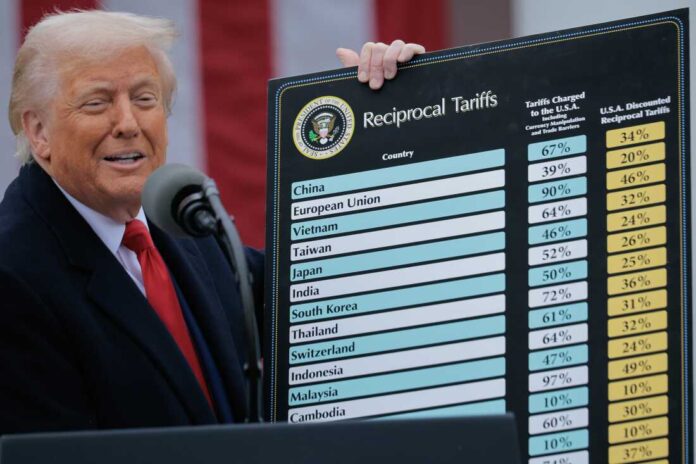Alex Batubo
Trumps act of increasing tariffs for American imports was a huge shock to global capitalism. It also reminds us how powerful the US is – but could be declining. Forty years of free trade and work of the World Trade Organisation was over-turned.
But even then, the US Government is not all powerful. Lower stock market prices and US government debt prices showed the discontent of the American ruling class. This forced a reversal of many tariffs and a delay in their implementation, except for China, from Trump within days. Reminding us that the private sector bosses remain all powerful, not governments.
Chinese exporters will now be charged import tariffs of 145% on all the goods (except for some IT products). As a result, the cost of buying Chinese products in the US will be far more than twice as much. Nigerian exporters will have to pay extra taxes of 10% on any exports to the US. This will immediately put up the prices of imports for Americans.
Trump hopes that this will reduce imports, encourage investment in factories in the US and so reduce unemployment (eventually). He also hopes to reduce the value of the dollar, fund tax cuts for the rich. Another policy of his is that he also wants US ally governments to spend more on the military to reduce the huge US Government costs – for example, in Ukraine, but also around China and Taiwan.
But the major impact is to increase uncertainty and economic growth around the world. Increased costs of imported goods will reduce the volume of sales and so production in exporting countries. One result is a reduction in the price of crude oil and further devaluation of the naira. As a result, governments in Nigeria may have less money and will again claim not to be able to afford to fully implement the minimum wage.
But even the FCT and 20 states are refusing to pay the minimum wage to local government and health workers (nine months late). They have been on strike since the end of March (24th) and held major protests a month later. This is when FAAC oil money monthly distributions are 40% more than last year. Nigerian banks and other companies are also announcing record private sector profits. Growth forecasts globally and in Nigeria have been reduced (although the IMF is still predicting 3% growth for Nigeria this year which is reasonable).
The FAAC April meeting distributed a near record amount of oil money to state and Federal governments. The meeting distributed N1.578tn. This is over 40% more than April 2024. In the first four months of this year oil money has been 41% more than the same months of last year – this is a huge increase and far more than inflation. Devaluation of the naira increases our prices, but increases income for states and Federal governments.
Over 80% of Nigerian foreign trade was with Britain in the 1930s. This reduced to 60% by independence in 1960. Now only 2% of Nigerian foreign trade is with Britain. Why did British companies stop trading with Nigeria if it was such an advantage to them?
The major foreign trade partners for Nigerian companies are now China and India, at 17 and 12 per cent respectively. Trade with the US is only 5% of the total. Europe is still Nigeria’s largest trade partner and is still higher than Asia.
The benefits of the dollar being the global reserve currency mean that the US Government can have debts of nearly 125% of GDP. This is at least twice level for many African countries and three times that of Nigerian governments. China is one of the largest holders of US Government debt, but has been selling its debt holdings in recent years and it now only holds around 2% of the total debt.
Trump’s goal of de-coupling from China and reindustrialising the US seems unlikely. What kind of reindustrialisation is possible when Chinese wages are only a fifth of US levels? Only some industries will return to US soil and even then, pressures for automation and attacks on workers’ rights would dominate. Manufacturing jobs in the US are not necessarily good jobs. These require strong unions and effective worker organisation, something Trump opposes.
The major aim of Trump’s tariffs are for US based companies to compete more effectively against Chinese companies. But two economies are now greatly integrated and of comparable sizes. Many inputs for US manufacturing companies now come from China. In contrast, one of the major exports from the US to China are beans! China is spending far less on its military than the US Government. The US won the cold war against Russia, but is far less likely to win an economic war against China. This is another indicator of the end of the US global dominance.
We oppose Trump’s tariffs not for harming “our” national economy, but because they threaten inflation, job losses and broader attacks on workers on globally.
Our main argument remains that, in the economic good times or bad, we still need our trade unions to put up a robust fight. This is essential if the working peoples are to benefit from the wealth that we create. This wealth has increased significantly since at least the year 2000, but our minimum wage can buy far less than it could five, ten or twenty years ago. As a result, the minimum wage was almost three quarters of the per capita GDP in 1998, but is now less than a tenth. We have to change this!
Trump keeps on making changes to the tariff rates that the US Customs are charging on imports from different countries. The following link provides an update to mid-May. The rate for China has now reduced to 32.6%. There was also a 90 freeze for negotiations. All this uncertainty is having an adverse effect on international trade and will tend to reduce the price of oil and so impact on governments’ income in Nigeria. But the Federal and state governments still have more than enough money to pay a decent minimum wage.
https://www.theguardian.com/us-news/2025/may/17/trump-liberation-day-tariff-walk-back
For a more recent major article on this subject see: https://isj.org.uk/trump-economic-chaos-2/






